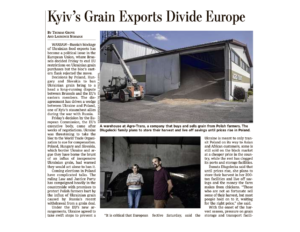A prolonged military conflict in the Middle East could potentially upend key commodity markets due to Iran’s control of the Strait of Hormuz, one of the world’s most important trade…
EU Lifts Ban on Kyiv’s Grain Exports; as Poland, Hungary, Slovakia Introduce Restrictions
Wall Street Journal writers Thomas Grove and Laurence Norman reported in Saturday’s paper that, “Russia’s blockage of Ukrainian food exports has become a painful political issue next door in the European Union, where Brussels decided Friday to end EU restrictions on Ukrainian grain purchases but the bloc’s eastern flank immediately rejected the decision.
“Decisions by Poland, Hungary and Slovakia to ban Ukrainian grain bring to a head a long-running dispute between Brussels and the EU’s eastern members. The disagreement has rekindled tensions within the bloc and driven a wedge between Ukraine and Poland, one of Kyiv’s staunchest allies throughout the war with Russia.

“Friday’s decision by the European Commission, the EU’s executive body, came after weeks of negotiations aimed at finding a compromise. Ukraine was threatening to take the bloc to the World Trade Organization to sue for compensation. Poland, Hungary and Slovakia, which border Ukraine and argue they have borne the brunt of an influx of inexpensive Ukrainian grain, had warned they would act alone to keep it out.”
“Under the EU’s new arrangements, Ukraine agreed to take swift steps to prevent a surge in grain exports to the bloc. The Commission agreed to refrain from imposing restrictions as long as the Ukrainian measures were effective,” the article said.
I just spoke with @vonderleyen.
— Volodymyr Zelenskyy / Володимир Зеленський (@ZelenskyyUa) September 15, 2023
All previous European Commission restrictions on Ukraine's agricultural exports have now been lifted.
I thanked Ursula von der Leyen for keeping her word and upholding the rules of the single market. This is an example of Ukraine and the EU…
On Friday, Financial Times writers Andy Bounds, Alice Hancock, Raphael Minder, and Susannah Savage reported that,
The EU has ignored pleas from Poland and ended a partial ban on grain imports from Ukraine, asking Kyiv instead to voluntarily prevent surges of produce into neighbouring countries.
“Poland, Hungary, Romania and Slovakia had demanded that curbs on four grains, including wheat and maize, that expire on Friday be carried through until the end of the year to protect their farmers from cheap competition.
“But weeks before elections in Warsaw and Bratislava, Brussels concluded that ‘market distortions’ in the member states bordering Ukraine had ‘disappeared’ since the temporary ban was introduced in May.”
❗Minister of Agriculture @DrNagyIstvn1: In response to the recent decision by Brussels to lift the ban on Ukrainian agricultural product imports, Hungary is taking matters into its own hands to safeguard its farmers, and will maintain and expand the import ban within its… pic.twitter.com/LssvTxzCIL
— Zoltan Kovacs (@zoltanspox) September 15, 2023
The FT writers explained that, “Facing this potential challenge to the European Commission’s authority over trade policy, senior EU officials called for member states to ‘work in the spirit of compromise.’ Valdis Dombrovskis, the EU’s trade commissioner, said ‘the best of course would be for member states to refrain from unilateral measures.’
“A majority of member states had also opposed the extension, according to several diplomats. The commission said that, in place of a formal ban, Kyiv would instead introduce ‘legal measures’ within 30 days ‘to avoid grain surges.'”
And Reutes writers Julia Payne and Alan Charlish reported on Friday that, “Ukraine was one of the world’s top grain exporters before Russia’s 2022 invasion reduced its ability to ship agricultural produce to global markets. Ukrainian farmers have relied on grain exports through neighbouring countries since the conflict began as it has been unable to use the favoured routes through Black Sea ports.
“But the flood of grains and oilseeds into neighbouring countries reduced prices there, impacting the income of local farmers and resulting in governments banning agricultural imports from Ukraine. The European Union in May stepped in to prevent individual countries imposing unilateral bans and imposed its own ban on imports into neighbouring countries. Under the EU ban, Ukraine was allowed to export through those countries on condition the produce was sold elsewhere.”
New York Times writers Mike Ives and Gaya Gupta reported on Saturday that, “Hours after the European Union ended a temporary ban on imports of Ukrainian grain and other products to five member nations, three of them — Poland, Hungary and Slovakia — defied the bloc and said they would continue to bar Ukrainian grain from being sold within their borders.”
The Times article added that,
It was not immediately clear early Saturday how the rapid sequence of developments on Ukrainian agricultural exports to Europe would affect markets in Ukraine, Eastern Europe or beyond.
Bloomberg writer Piotr Skolimowski reported on Saturday that, “Poland, Hungary and Slovakia defied the European Union’s decision to end a ban on imports of crops from Ukraine, saying they would press ahead with unilateral restrictions to protect their own markets.
“The measures won’t apply to Ukrainian products transiting through Eastern Europe to third countries, and the impact of Friday’s EU move – as well as the rapid pushback – on global markets is expected to be limited.”





